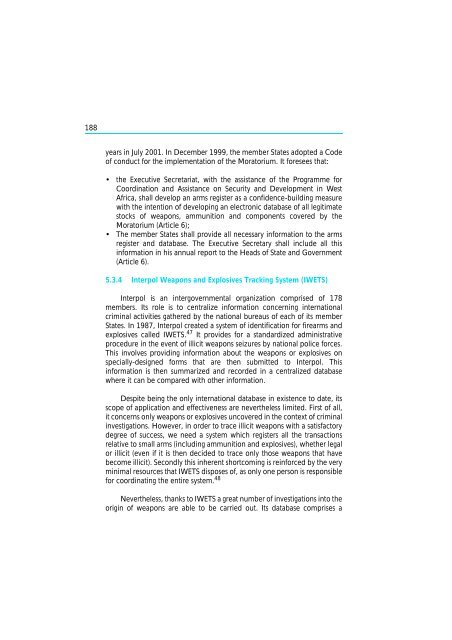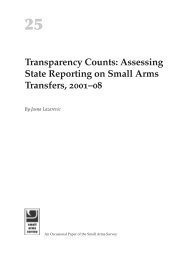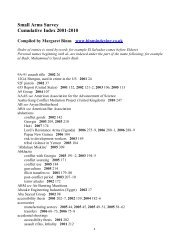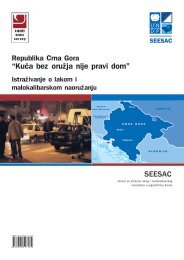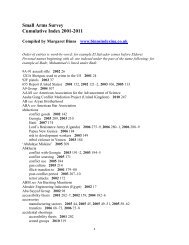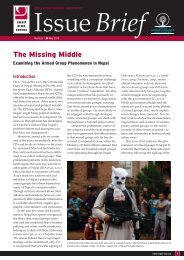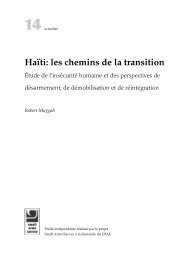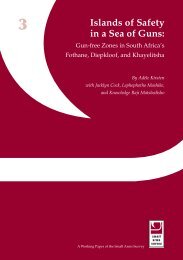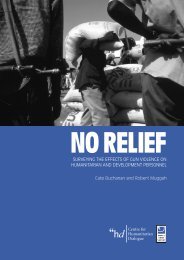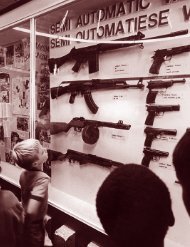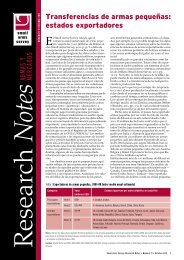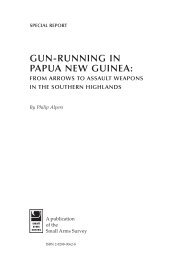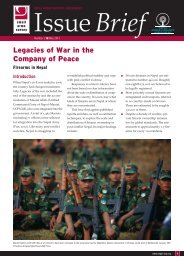The Scope and Implications of a Tracing Mechanism for Small Arms ...
The Scope and Implications of a Tracing Mechanism for Small Arms ...
The Scope and Implications of a Tracing Mechanism for Small Arms ...
You also want an ePaper? Increase the reach of your titles
YUMPU automatically turns print PDFs into web optimized ePapers that Google loves.
188<br />
years in July 2001. In December 1999, the member States adopted a Code<br />
<strong>of</strong> conduct <strong>for</strong> the implementation <strong>of</strong> the Moratorium. It <strong>for</strong>esees that:<br />
• the Executive Secretariat, with the assistance <strong>of</strong> the Programme <strong>for</strong><br />
Coordination <strong>and</strong> Assistance on Security <strong>and</strong> Development in West<br />
Africa, shall develop an arms register as a confidence-building measure<br />
with the intention <strong>of</strong> developing an electronic database <strong>of</strong> all legitimate<br />
stocks <strong>of</strong> weapons, ammunition <strong>and</strong> components covered by the<br />
Moratorium (Article 6);<br />
• <strong>The</strong> member States shall provide all necessary in<strong>for</strong>mation to the arms<br />
register <strong>and</strong> database. <strong>The</strong> Executive Secretary shall include all this<br />
in<strong>for</strong>mation in his annual report to the Heads <strong>of</strong> State <strong>and</strong> Government<br />
(Article 6).<br />
5.3.4 Interpol Weapons <strong>and</strong> Explosives Tracking System (IWETS)<br />
Interpol is an intergovernmental organization comprised <strong>of</strong> 178<br />
members. Its role is to centralize in<strong>for</strong>mation concerning international<br />
criminal activities gathered by the national bureaus <strong>of</strong> each <strong>of</strong> its member<br />
States. In 1987, Interpol created a system <strong>of</strong> identification <strong>for</strong> firearms <strong>and</strong><br />
explosives called IWETS. 47 It provides <strong>for</strong> a st<strong>and</strong>ardized administrative<br />
procedure in the event <strong>of</strong> illicit weapons seizures by national police <strong>for</strong>ces.<br />
This involves providing in<strong>for</strong>mation about the weapons or explosives on<br />
specially-designed <strong>for</strong>ms that are then submitted to Interpol. This<br />
in<strong>for</strong>mation is then summarized <strong>and</strong> recorded in a centralized database<br />
where it can be compared with other in<strong>for</strong>mation.<br />
Despite being the only international database in existence to date, its<br />
scope <strong>of</strong> application <strong>and</strong> effectiveness are nevertheless limited. First <strong>of</strong> all,<br />
it concerns only weapons or explosives uncovered in the context <strong>of</strong> criminal<br />
investigations. However, in order to trace illicit weapons with a satisfactory<br />
degree <strong>of</strong> success, we need a system which registers all the transactions<br />
relative to small arms (including ammunition <strong>and</strong> explosives), whether legal<br />
or illicit (even if it is then decided to trace only those weapons that have<br />
become illicit). Secondly this inherent shortcoming is rein<strong>for</strong>ced by the very<br />
minimal resources that IWETS disposes <strong>of</strong>, as only one person is responsible<br />
<strong>for</strong> coordinating the entire system. 48<br />
Nevertheless, thanks to IWETS a great number <strong>of</strong> investigations into the<br />
origin <strong>of</strong> weapons are able to be carried out. Its database comprises a


